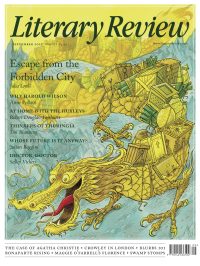Tim Blanning
Big Trouble in Little Jena
Magnificent Rebels: The First Romantics and the Invention of the Self
By Andrea Wulf
John Murray 494pp £25
In 1793 Caroline Böhmer paid for her support for the French Revolution with arrest by the Prussians and three months of incarceration in a damp, dark, overcrowded, vermin-infested cell in the fortress of Königstein. It was made doubly painful by her having to share her suffering with her seven-year-old daughter. Intelligent, well educated, physically attractive, articulate and with a strong personality (‘I never flatter, I say what I think and feel’), Böhmer liked to be in charge. She was also unconventional when it came to sexual morality. Her spell in prison was complicated by the discovery that she was pregnant, the result of a one-night stand with a teenage French soldier. It was not to be the last of her extramarital adventures.
Böhmer was the queen bee of the ‘Jena Set’, a group of intellectuals who settled in that little Thuringian town in the mid-1790s. Rarely has there been such a concentration of cerebral power in such a small place (population 4,500). The dramatis personae, printed at the beginning of the book, include Goethe, Schiller, Fichte, Hegel, Novalis and the Humboldt brothers, any one of whom would have been enough to put a town on the map. Although mainly resident in Weimar, twenty kilometres away, Goethe was often in Jena, sometimes staying for weeks in the apartment he kept there. Böhmer herself arrived in 1796 with her new husband, August Wilhelm Schlegel, to join what was already a distinguished company. Jena’s drawing power came principally from its university, founded in 1558, its very existence demonstrating the cultural advantages derived by the Holy Roman Empire of the German Nation from its political fragmentation.
The thread holding this disparate group together is identified by Andrea Wulf as a common concern with the self. Their inward gaze liberated them from conventions, made them rebellious and gave them a feeling of invincibility. Moreover, their collective emancipation had an enduring impact: ‘the liberation of the Ich

Sign Up to our newsletter
Receive free articles, highlights from the archive, news, details of prizes, and much more.@Lit_Review
Follow Literary Review on Twitter
Twitter Feed
Under its longest-serving editor, Graydon Carter, Vanity Fair was that rare thing – a New York society magazine that published serious journalism.
@PeterPeteryork looks at what Carter got right.
Peter York - Deluxe Editions
Peter York: Deluxe Editions - When the Going Was Good: An Editor’s Adventures During the Last Golden Age of Magazines by Graydon Carter
literaryreview.co.uk
Henry James returned to America in 1904 with three objectives: to see his brother William, to deliver a series of lectures on Balzac, and to gather material for a pair of books about modern America.
Peter Rose follows James out west.
Peter Rose - The Restless Analyst
Peter Rose: The Restless Analyst - Henry James Comes Home: Rediscovering America in the Gilded Age by Peter Brooks...
literaryreview.co.uk
Vladimir Putin served his apprenticeship in the KGB toward the end of the Cold War, a period during which Western societies were infiltrated by so-called 'illegals'.
Piers Brendon examines how the culture of Soviet spycraft shaped his thinking.
Piers Brendon - Tinker, Tailor, Sleeper, Troll
Piers Brendon: Tinker, Tailor, Sleeper, Troll - The Illegals: Russia’s Most Audacious Spies and the Plot to Infiltrate the West by Shaun Walker
literaryreview.co.uk